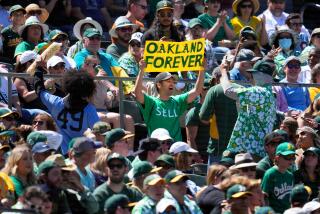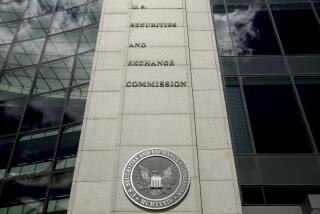American Funds Bucks Norm, Fights NASD
- Share via
Mutual fund giant American Funds, fighting regulators who say it improperly steered stock trades to brokerages that promoted its funds, is about to get its day in court.
On Monday, the Los Angeles-based company will go before a hearing panel of the NASD, the securities industry’s self-regulatory agency, to argue that it has been wrongly accused.
The case is unusual in that it has come to a hearing: Fund companies typically have settled regulators’ complaints by paying significant fines without admitting or denying guilt.
But American Funds has bucked the industry norm by demanding that regulators prove their allegations. The company, owned by privately held Capital Group Cos., has said in previous statements that its business deals with brokerages “complied fully with both the spirit and the letter” of NASD rules.
A spokesman for American Funds, which has been the best-selling fund firm for the last four years and last year surpassed Fidelity Investments to become the largest U.S. manager of stock and bond mutual funds, declined to comment on the hearing.
A spokesman for the NASD in Washington also declined to discuss the proceeding.
The NASD, formerly known as the National Assn. of Securities Dealers, filed a case against American Funds in February 2005, alleging that the firm violated securities rules from 2001 through 2003 by giving stock trading business as a reward to brokerages that pushed its funds to their clients.
Until 2004, when the Securities and Exchange Commission banned the practice entirely, fund companies were allowed to send stock trades to brokerages based in part on fund sales levels.
But the rules governing the practice forbade a direct tie-in between a brokerage’s fund sales and the amount of fee-generating stock trading business it received from a fund company.
The prohibition was designed to reduce the potential for a brokerage to tout a particular group of funds to clients simply because the brokerage itself had an extra financial incentive, beyond the standard “load,” or commission, earned on fund sales.
The NASD alleged that American Funds’ distribution arm paid $100 million to about 50 brokerages from 2001 through 2003 for executing stock trades, both “to reward past sales and to encourage future sales” of funds.
Under what the NASD called “sponsorship arrangements,” American Funds “calculated ‘target commissions’ that it intended to direct to each of the top-selling retailers” based on the brokerages’ sales of the company’s funds the year before, the agency said in its complaint.
The company “also discussed with the top-selling retail firms the benefits that [it] expected to receive pursuant to the sponsorship arrangements, such as inclusion of American Funds on the firms’ ‘preferred fund’ or ‘recommended fund’ lists,” the complaint said.
The regulator, which has settled similar cases with 30 other fund firms and brokerages in recent years, said the arrangements violated NASD rules that prohibited quid pro quo agreements -- meaning, a fund company couldn’t promise a certain level of stock trading volume based on fund sales.
But American Funds has insisted that it never had such formal agreements with brokerages. The firm has said it had “internal, informal targets” for directing trades, which it said were permitted under the rules.
Securities industry lawyers say the case may hinge on whether the NASD has a smoking gun -- evidence, in writing, that would show quid pro quos.
Without irrefutable evidence, “it’s going to be a ‘he said, she said’ type of routine” at the hearing, said Geoff Bobroff, a securities lawyer and head of Bobroff Consulting in East Greenwich, R.I.
He said American Funds probably would call as witnesses brokerage executives “who will say, ‘They never promised us anything.’ ”
The proceeding, presided over by a three-member panel -- a professional hearing officer and two securities industry representatives -- is similar to a trial but is not open to the public. Both sides can call witnesses.
Cheryl Moore, a partner at law firm Patton Boggs in Dallas, said the case waded into a murky area of regulation because fund companies had been permitted to consider brokerages’ fund sales in sending trades to the firms. A key question thus could be what “consider” meant in that context.
She also noted that the NASD did not allege that shareholders were harmed by American Funds’ practices.
The 75-year-old company, which manages more than $850 billion in stock and bond fund assets, has long had a reputation for conservative money management and strong investment returns.
California Atty. Gen. Bill Lockyer also has a case pending against American Funds, alleging that it failed to adequately disclose the marketing agreements it had with brokerages.
More to Read
Inside the business of entertainment
The Wide Shot brings you news, analysis and insights on everything from streaming wars to production — and what it all means for the future.
You may occasionally receive promotional content from the Los Angeles Times.










